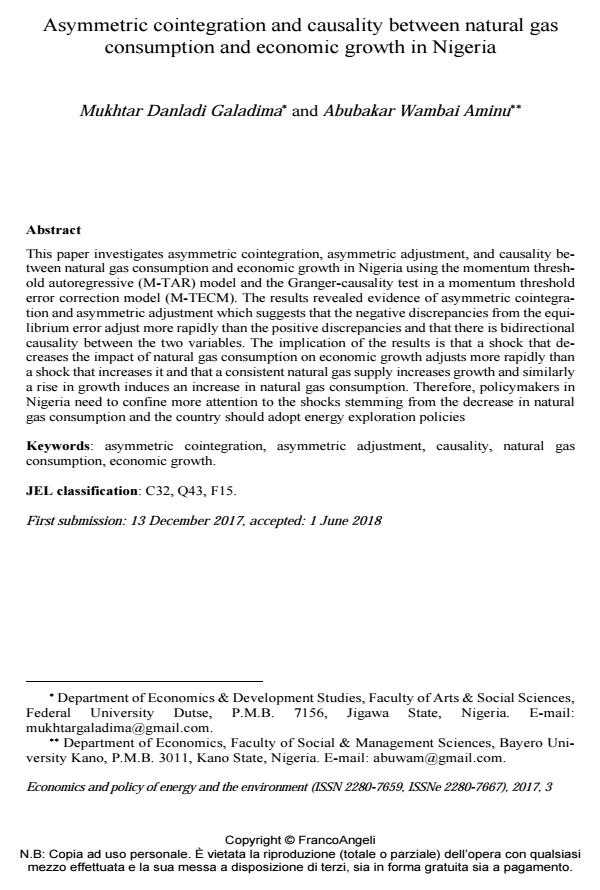Asymmetric cointegration and causality between natural gas consumption and economic growth in Nigeria
Journal title ECONOMICS AND POLICY OF ENERGY AND THE ENVIRONMENT
Author/s Mukhtar Danladi Galadima, Abubakar Wambai Aminu
Publishing Year 2018 Issue 2017/3 Language Italian
Pages 13 P. 59-71 File size 240 KB
DOI 10.3280/EFE2017-003004
DOI is like a bar code for intellectual property: to have more infomation
click here
Below, you can see the article first page
If you want to buy this article in PDF format, you can do it, following the instructions to buy download credits

FrancoAngeli is member of Publishers International Linking Association, Inc (PILA), a not-for-profit association which run the CrossRef service enabling links to and from online scholarly content.
This paper investigates asymmetric cointegration, asymmetric adjustment, and causality between natural gas consumption and economic growth in Nigeria using the momentum threshold autoregressive (M-TAR) model and the Granger-causality test in a momentum threshold error correction model (M-TECM). The results revealed evidence of asymmetric cointegration and asymmetric adjustment which suggests that the negative discrepancies from the equilibrium error adjust more rapidly than the positive discrepancies and that there is bidirectional causality between the two variables. The implication of the results is that a shock that decreases the impact of natural gas consumption on economic growth adjusts more rapidly than a shock that increases it and that a consistent natural gas supply increases growth and similarly a rise in growth induces an increase in natural gas consumption. Therefore, policymakers in Nigeria need to confine more attention to the shocks stemming from the decrease in natural gas consumption and the country should adopt energy exploration policies
Keywords: Asymmetric cointegration, asymmetric adjustment, causality, natural gas consumption, economic growth.
Jel codes: C32, Q43, F15
- Adegbemi B.O., Adegbemi O.O., Olalekan A.J., Babatunde O.O. (2013). Energy Consumption and Nigerian Economic Growth: An Empirical Analysis. European Scientific Journal, 94: 1857-7881.
- Adelman M.A. (1993). The Economics of petroleum supply. The Energy Journal, 2: 238-240.
- Agbonifo P. (2016). Natural Gas Distribution Infrastructure and the Quest for Environmental Sustainability in the Niger Delta: The Prospect of Natural Gas Utilization in Nigeria. International Journal of Energy Economics and Policy, 6(3): 442-448.
- Al-Shubiri F. (2015). The impact of economic and financial variables on cash conversion cycle of energy, oil and gas sectors listed in muscat security market. International Journal of Energy Economics and Policy, 5(1): 174-181.
- Apergis N., Payne J.E. (2010). Natural gas consumption and economic growth: A panel
- investigation of 67 countries. Appl. Energ., 87: 2759-2763. Aviral K., Mihai M. (2016). The revenues-spending nexus in Romania: a TAR and MTAR approach. Economic Research-Ekonomska Istraživanja, 29: 735-745.
- Dogan E. (2014). Energy consumption and economic growth: Evidence from low-income countries in Sub-Saharan Africa. International Journal of Energy Economics and Policy, 4(2): 154.
- Dogan E. (2015). Revisiting the relationship between natural gas consumption and economic growth in Turkey. Energy Sources, Part B: Economics, Planning, and Policy, 10: 361-370.
- Dogan E. (2016). Analyzing the linkage between renewable and non-renewable energy consumption and economic growth by considering structural break in time-series data. Renewable Energy, 99: 1126-1136.
- Dogan E., Sebri M., Turkekul B. (2016). Exploring the relationship between agricultural electricity consumption and output: New evidence from Turkish regional data. Energy Policy, 95: 370-377.
- Enders W., Siklos P.L. (2001). Cointegration and threshold adjustment. Journal of Business and Economic Statistics, 19: 166‐176.
- Gbadebo O.O., Chinedu O. (2009). Does energy consumption contribute to economic performance? Empirical evidence from Nigeria. Journal of Economics and International Finance, 1(2): 044-058.
- Hu J.L., Lin C.H. (2008). Disaggregated energy consumption and GDP in Taiwan: A threshold co-integration analysis. Energy Economics, 30: 2342-2358.
- Karacaer-Ulusoy M., Kapusuzoglu A. (2017). The dynamics of financial and macroeconomic determinants in natural gas and crude oil markets: evidence from organization for economic cooperation and development/gulf cooperation council/organization of the petroleum exporting countries. International Journal of Energy Economics and Policy, 7(3): 167-187.
- Kum H., Ocal O., Aslan A. (2012). The relationship among natural gas energy consumption, capital and economic growth: Bootstrap-corrected causality tests from G-7 countries. Renewable and Sustainable. Energy Reviews, 16: 2361-2365.
- Lee C.C., Chang C.P. (2005). Structural breaks, energy consumption and economic growth revisited: evidence from Taiwan. Energy Economics, 27: 857-872.
- Olusegun O.A. (2008). Energy consumption and economic growth in Nigeria: A bounds testing cointegration approach. Journal of Economics Theory, 2: 118-123.
- Sahbi F., Muhammad S. (2014). The Role of Natural Gas Consumption and Trade in Tunisia’s Output. Munich Personal RePEc Archive, 1-22.
- Shahbaz M., Arouri M., Teulon F. (2014). Short- and long-run relationships between natural gas consumption and economic growth: Evidence from Pakistan. Economic Modelling, 41: 219-226.
- Woo K.Y., Jia L.X. (2013). Threshold Cointegration and Causality between CPI and PPI in Selected Countries – Some International Evidence. Working Paper Series, 1-25.
- Zamani M. (2007). Energy consumption and economic activities in Iran. Energy Economics, 29: 1135-1140.
- Zamani N. (2016). How the Crude Oil Market Affects the Natural Gas Market? Demand and Supply Shocks. International Journal of Energy Economics and Policy, 6(2): 217-221.
- Short-term dynamics and long-term relationship between natural gas consumption and economic growth in Nigeria: an ARDL approach with breaks Mukhtar Danladi Galadima, Abubakar Wambai Aminu, Ibrahim Muhammad Adam, Ibrahim Mohammed Adamu, Hassan Hassan Suleiman, in Environmental Science and Pollution Research /2022 pp.52818
DOI: 10.1007/s11356-022-19457-8
Mukhtar Danladi Galadima, Abubakar Wambai Aminu, Asymmetric cointegration and causality between natural gas consumption and economic growth in Nigeria in "ECONOMICS AND POLICY OF ENERGY AND THE ENVIRONMENT" 3/2017, pp 59-71, DOI: 10.3280/EFE2017-003004